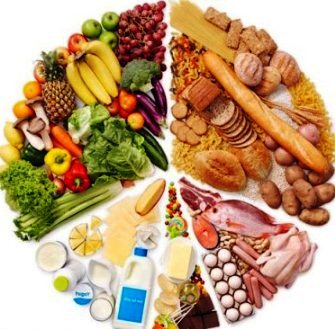Hello there,
Prior to becoming a Certified Personal Trainer and then a Sport Nutritionist, and as someone who has always been lean and on the lighter side of the scale, diet had long been an enigma to me. This is why I wrote this full, complete, ultimate diet guide. But first, a bit of context.
Fitness, nutrition lobbies and other scientific guys give you ratios of what you are supposed to eat, with the exact amount of kcal, and tons of protein you are expected to get via supplements sold by juiced-up freaks that claim it’s nothing but vital. Some say carbs are shit, others say fat is evil. Some say you can eat whatever you want to follow a precise protocol; others swear by the trendy chicken/broccoli/rice combo. If this is so complicated, then why even bother?
News flash: I am here to tell you it’s not. It can be shortened in one sentence:
EAT FOR YOUR HEALTH FIRST AND THEN FOR PERFORMANCE
You can’t get big if you are sick.
You can’t get lean if you are ill.
You can’t be in shape if you are tired.
You can’t be in shape if your guts are in a poor condition.
You can’t train hard if your body is weak.
You can’t recover if your diet is trash.
You can’t enjoy your life if you are always carrying 4 Tupperwares around daily (don’t say it’s never happened to you. I’ve tried).
You can’t enjoy social events if you can’t drink or eat the same (or close to) as everyone else (I remember seeing my friends eating pizza while I was with my chicken and almonds (cool story, bruh)).
In short, following a great diet plan will help you with:
- Easier and faster fat loss
- Easier muscle building, without adding slabs of fat
- Better sleep and recovery
- Improved digestion
- Better immunity
- Enhanced sex life (yes, that’s for real, no BS)
- Happier mood
- More energy lasting the whole day
- More mental sharpness and easier focus state
- Fewer inflammations over the whole body
Now, let’s keep it simple. Eight guidelines are all we need.

If Arnold did it, maybe there is some advice to pick up from him!
Eat Real Whole Food 90% Of The Time
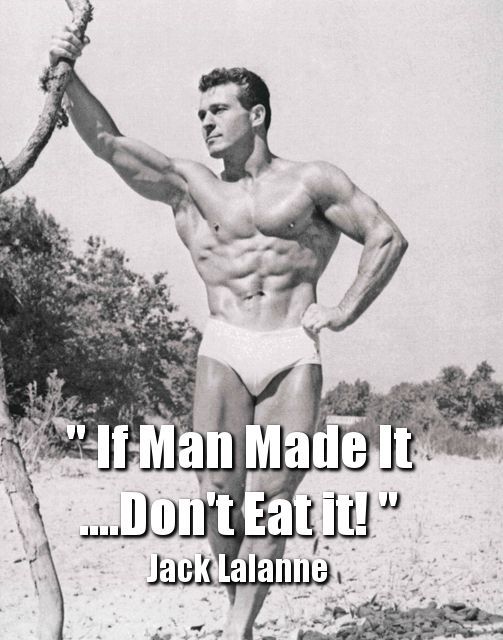
Before saying anything about how and why, let’s just make this statement. 90% of your diet should consist of real, whole, unprocessed foods. Think raw fruits, chicken breasts, whole eggs. Juices, processed food and prepared meal aren’t.
More than macronutrients, you need to be sure to have a satisfying diet. Not one made of shakes and pills but with natural food, that includes micronutrients. If all you care about is having nothing but abs year-round, you won’t keep them for that long. Trust me.
The essential of your diet should consist of:
- Whole fruits and veggies of all colors (frozen are good too)
- Animal product like meat, fish, dairies and egg
- Combination of grains and vegetables (especially if you are vegetarian/vegetalian)
- Potatoes and roots of all kind
- Nuts and raw cocoa
- Water first (always), then tea and coffee
These foods will load you up with vitamins, minerals, antioxidants and will assure a balanced diet. Thus, you will get your macronutrients from the best sources possible.
Proteins are the building blocks of the body, they help it to sustain itself or grow. You need a lot of it when you want to build muscle.
Fats help with the hormonal balance and the cells’ exchange within the body. You will need them -the right ones- whatever your goal is.
Carbs are what your body uses primarily as fuel. If you want to train hard and recover from your day, you will definitely need them. Just like fats, you need the right ones in the right amount.
Eat What You Want 10% Of The Time
This is something that a lot of try-hard people don’t seem to get, just like the frustrated ones. If your core diet is comprised of essential things, you can enjoy some less healthy food, as long as it’s minimal. Remember what I said above: a good diet should not keep you from eating anything in social events, you just need to show some restraint. And of course, if you are physically very active, you got way more room to enjoy some foods than your sedentary clone.
Let’s take an example: you get 3 meals per day. That makes 21 meals per week. If we take 10% off it, we get 2. Do you really think that 2 not-that-healthy meal choices per week will wreck the 19 meals overall effect? No! Don’t stress about it. As long as you stay moderate, you can enjoy your drinks, cakes or whatever.
Don’t try to duplicate other people’s diets who are preparing for bodybuilding shows, photoshoots and/or make money off it, when all you want is just to look good, be more confident and enjoy life a little more.
“All is poison, nothing is poison. The dosage makes the poison” – Hippocrates
Eat The Right Amount For Your Goal
Let’s make it simple. Kcal are the fuel for your body. The more you eat, the more available fuel you get. The less you eat, the less fuel you are giving to your body to function properly. That’s exactly how we proceed to gain or lose weight:
You want to gain weight = you get your body more kcal that it needs. You want to lose weight = you get less kcal that it needs. Simple.
In magazines or on the internet, you can see BS diets that make you drop all carbs or all fats, make you live on nothing but chicken and proteins shakes, leaving you half-dead after just a normal day (and they were stating you’d end up looking like a god/goddess…). Overcomplicating stuff, as always, plus it’s harmful. Again, the key here is to find what amount of kcal is necessary to maintain your weight, then add or subtract 200-300kcal to get you started. You don’t need a perfect meal plan, you just need a starting point.
Multiple studies have been done to calculate exactly how much kcal each of us needs depending on his age, height, sex, body fat, etc. Truth is there are too many factors to be 100% precise, so here are some basic guidelines to give you an idea:
Fat loss: 26 x your bodyweight in kg or 12 x your bodyweight in lbs
Maintenance: 35 x your bodyweight in kg or 16 x your bodyweight in lbs
Muscle building: 44 x your bodyweight in kg or 20 x your bodyweight in lbs
Of course, your level of physical activity will make it vary, but that gives you an overall idea. If you want to get more precise, there are tons of calculators but they will just give you just an idea, not a dead right answer.
I am around 176lbs/80kg, which means I would need 2100kcal to lose fat, 2800kcal to maintain and 3500kcal to bulk. This is more or less true, but being someone who always burns faster than the average, and with my actual lifestyle, I’d probably have to add at least 500-800kcal everywhere to be true. Don’t overcomplicate it, just start somewhere.

I’m pretty sure this man doesn’t eat 1800kcal only, and is afraid of losing the definition of his abs!
Get Your Macros Right
Proteins
Now that we have the kcal needed, let’s focus on the easiest part of the macros assessment: proteins.
I could get you K.O. with the number of studies done on that subject. Instead, I am going to give you what they all -more or less- agreed upon: 1gr/lbs or 2,2gr/kg
So, I would need around 180gr of protein per day. You can afford a bit less when you are in a caloric surplus since you don’t need to fear to lose muscle giving you get in more than you need. But you can rise it a bit on fat loss, just to be sure you don’t eat on lean tissue or as little as possible. 1gr of protein = 4kcal, so I get 720kcal from it.
Fats
There are multiple types of fats made of different fatty acids.
- The first one to avoid as much as possible are trans fats. Basically, it’s hydrogenated fats used to better preserve processed foods. You find it nearly everywhere in processed foods. Nothing good comes from them, they are the ones that will wreck your whole body.
- The second ones are saturated fats. Despite all the BS media has told you, they are bad only if they come from the wrong sources, and if they are taken in too high quantities. That’s what your body uses a lot for hormonal balance. It can be found mainly in animal fat but also in cocoa and coconut product. The problem with fat coming from animal products like eggs, dairies and meats is quality. Since it’s so hard to get high-quality meat and dairy in the current meat and dairy industries, you should avoid them whenever you can except if you can have whole, organic, local, free range eggs and meat pieces. Same for dairies, depends of how and what the animal ate. If you can’t get them like this, simple: get your steak as lean as possible, and if you still need to eat dairies, then go for the least fatty ones; make sure your chicken had a certified good diet and lifestyle; that should be enough to get the most out of them. However, if you can get really high quality/hunted meat pieces, make sure you have some.
- The third ones are monounsaturated fats. You can never go wrong with them, they are basically the best fats as they will make the cells membranes and facilitate exchange between them. They also protect your heart and health from a lot of diseases. You’ll find them in nuts, olive oil, almonds, peanut… Everything that is tasty and good for you!
- The fourth and last ones are the polyunsaturated fats. They are the most sought after because the modern Joe average diet contains very little of them. They help regulate inflammations, cell exchanges and a lot of other body functions. There are two of them: omega 6 & 3. You will need to focus on getting as much omega 3 as possible since they are the ones we struggle to get enough nowadays, while omega 6 is easy to overconsume. The first one is anti-inflammatory, helps with lipolysis (burning fat), hormonal balance, brain memory and heart health. The second one is good for your skin, hair and nails, but overconsuming it can lead to pro-inflammatory stuff and cause easier fat gain, because of a less efficient use of them. Scientists and researchers agreed upon having an omega 6 to 3 ratio of 1:1 to 4:1 for optimal health. Actually, our modern average diet gets us more in a 15:1 to 20:1 ratio. You can find omega 6 everywhere: in animal products, nuts, grains, dairies… while omega 3 are essentially found in cold-water fishes like salmon, sardines, mackerels, flax seed/oil and in some nuts like Grenoble nuts, Brazil nuts and almonds.
Again, I could dig you up thousands of studies about fat consumption but, to keep it simple, you need approximately between 1gr-1,5gr/kg or 0,5-0,65gr/lbs. Less than that isn’t recommended as it wouldn’t be enough to support a healthy normal body function in the long term. Again, taking myself as an example, that’s 80-120gr, giving me 720 to 1080kcal coming from them since 1gr of fat = 9kcal
Carbs
They are your leverage in diet, helping you the most with balancing between a deficit, maintenance and a surplus caloric diet. This is why I keep them last. They are fuel for your body, that’s it. To enjoy them as much as you can with as little drawbacks as possible, you should eat them around the workout and at breakfast.
You can find them in grains, fruits, veggies, roots, potatoes and a huge number of processed foods. Getting back to my point #1, you know which ones you are supposed to get first and foremost. To keep things simple, we are going to divide them into two:
The simple carbs are the fastest ones to be digested. They are the ones that make your blood sugar level rise and your insulin level peak. Mainly found in fruits, sucrose and, basically, everywhere sugar is. You should consume that before you workout to be full of energy and ready to smash the weights. Getting them anywhere else in the day could lead to fat gain since that’s what your body will do of them if they are of no use.
Except for the fructose, mainly found again in fruits but also in sugar: that one needs first to get past the liver that decides to either stock it for itself, or to release it in your blood. Too much sweet stuff may cause fat gains and a potential type 2 diabetes. Don’t worry about the fruits though, they aren’t high enough of it. Mind you, fruits juices and dried fruits shouldn’t be overconsumed either.
The complex carbs are slower to digest since your digestive system needs to divide their structure before absorbing them. They are found in grains, potatoes, roots and alike, or products made from them. They don’t spike insulin too much, so they are perfect for minimizing fat gain and fostering fat loss because they get you a stable blood sugar level.
As said above, they are what makes up for the remaining kcal you need for your goal. Let’s say I want to maintain; I already got 180gr of protein and I want to keep fat as low as possible, so 80gr. That gives me 720+720= 1440kcal. I need around 2800kcal to maintain, thus we do 2800-1440=1360kcal. Like protein, 1gr of carb = 4kcal so to find the required amount, we calculate 1360/4=340gr of carbs.
Boom, simple as that. I know that was a big chunk for you, but don’t worry, that was the hardest part.
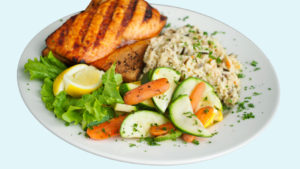
Proper meal for a good body
Eat 2-4 Meals Per Day
I am about to bust another fitness industry myth: you don’t need to eat every 2-3h to get in shape. You could, but that’s a lot of work, right? Meal prep, meal timing, carrying all your Tupperware and/or shakers around… Why just not eat huge infrequent meals? Fewer worries, less overthinking, less social awkwardness, more enjoyment and flexibility.
I was doing the typical 6-8 meals per day for months during my first year of training. Because all of this was so rigid, I would get stressed about missing a meal or having a delay of 15mn. The problem is that, back in those days, I wasn’t a pro fitness model, or pro bodybuilder or even pro athlete who actually somewhat benefits from that kind of schedule to excel.
You just need 2-4 meals per day. Why not more? I could give you the argument that you are making your digestive system work less, thus preserving it from fatigue and helping it to better recover, all the while still eating frequently enough to have a very good absorption and use of both macros and micros. You can’t eat a lot because you don’t have the appetite for, or even the capacity to do so? Just be patient, your stomach will get used to it.
A classic breakfast/lunch/dinner works great. Even just one lunch and one dinner too. Or a lunch, a little snack before a workout and then dinner. Or just a snack and then a huge dinner. Get a bit of fasting helps too with health, autophagy and hormonal balance. Whatever! As long as you have your kcal in. Ditch those plastic boxes and kitchen scale off your bag, and enjoy your freedom.
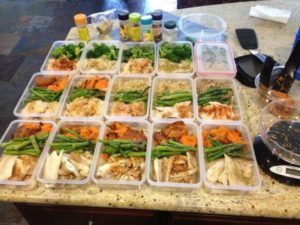
Why not make three huge salads with it? Of course, sorry. “Bodybuilding” and all that stuff, you know…
Eat Carbs Daily
Carbs are fuel. There are two moments you need them the most:
- Before/during the workout to fuel in and support performance while keeping as much as possible catabolism at bay
- At night to help you sleep and refeed your cells after a day of work (and physical activity I hope).
One easy way to get good carbs before your workout is to eat fruits. Since they don’t get well digested when mixed with other food, having them here gets us all the pros and nearly zero cons. You get your load of micronutrients, hydration and carbs while not having them fatigue the digestive system. Plus, they are easy to carry around if you workout straight after work.
What I love to do is adding a teaspoon of honey in my bottle of water during the workout, in order to get carb exactly when I need it (much like during a car race, when you stop at your garage to refuel when needed).
Remember that as an athlete in strength or endurance, we need to support our training and performance to build muscle, support lean tissues and optimize recovery too. So don’t get too caught up with the keto diet. They have a purpose, but not in general health and a flexible lifestyle approach.
That being said, have a huge portion of carbs at night to get those remaining. It can be rice, pasta, quinoa, oat, potatoes, sweet potatoes and everything made of it. This is great to enjoy a big meal and also have some social flexibility, leaving you stress-free and ready to have a sound sleep. Which means better recovery, so more muscle gains, more fat loss and more enjoyment.
Now, let says it has been a full rest day where you didn’t leave the couch or the bed. You still earned the right to get carbs after a hard week but if you really want to make sure you don’t get fat, just eat some fruits and veggies, and increase a bit the fat intake for more hormonal boost and recovery. This way, again, you get all the pros and no cons. Only sedentary people thrive on that type of regular diet because they don’t work out, and therefore don’t need fuel for high duration/intensity activities.
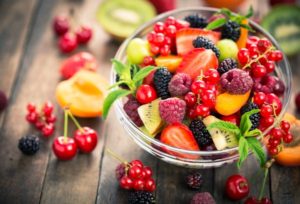
Your daily sweetness
Observe How Food Makes You Feel
Without speaking about allergies and intolerances, just knowing how your body reacts to food is key to ensure its proper digestion, absorption and elimination. See, I’m lactose intolerant, but I can still consume Whey protein, some cheeses and M&M’s despite the presence of milk powder or galactose/lactose. Why? Because the dosage is so tiny that my body can deal with it. I have zero problems with gluten -from wheat or another grain- but I get stomach pain and a bit of bloating when I exceed 300gr to a full pound of it per day. Why? Well, because it is just too much.
The same goes for you. You may have zero problems with anything, but that should not stop you from observing how your body reacts, and then knowingly make what’s best for your diet and your health. It is actually quite simple.
When you get some kind of bowel problem or weird feeling after a meal or a day, watch what you ate this day and remove what you feel may be the guilty ingredient. Rely on your own judgment and your instincts. Then observe how your body behaves. If it goes better: congrats, you’ve found the cause of your problem. It can also be the temperature of your meal, the speed at which you eat, the way it had been cooked…
- If you are farting your face off after a meal
- If your nose is stuffed or runs after a meal
- If you feel bloated or have some headache or joint pain after a meal
Something didn’t go well. Whereas:
- If you feel energized
- If you feel satisfied and ready to go
- If you even feel somewhat your veins being fuller and muscles more tense and ready to go
Then you are all good. See? Simple.
Learn To Supplement Smartly
Alright, that one is pretty straightforward. Supplements are useful and amazing when used correctly and for the appropriate need. Still, they’ll always remain supplements. They can help with a good diet plan, but should not be mandatory. That being said, we live in a modern world where pollution, plastic residues, aerial particles so our organisms are constantly subject to different and new stress sources every day.
Add that to the Wifi and cables emissions, noise and blue light, and you get a perfect ground for disease, bad sleep and bad feelings. In that scenario, getting a little boost for our health, longevity and well being could be appreciated. This is when supplements come forward. Here are the ones I recommend the most:
- Vitamin D3: to support bone density, muscles, hormonal balance and brain function.
- Vitamin K2: to support calcium good function, the circulatory system and bone density.
- Magnesium: helps with relaxing, avoiding cramps and spasming, better stress management. Factor in more than 1000 chemical reactions in the body.
- Vitamin C: boosts the immunity system, helps the synthesis of collagen.
- Zinc: a powerful antioxidant that helps with hormonal balance/recovery, and supports connective tissues.
- Whey protein: a useful and quick way to add in some cheap protein source with low carbs and fat quantities.
- Glucosamine/Chondroïtine: supports joints health, helps and strengthens cartilage, tendons and ligaments, prevents arthritis, arthrosis, tendinitis and help to recover from them.
- Adaptogenic herbs: Ashwagandha, Maca, Gotu Kola, Ginseng, Tribulus Terrestris, Fenugreek… are herbs used in traditional Indian medicine called Ayurveda to help and support several body functions at once. Depending on your problems, sickness and needs, they will adapt to you and act accordingly.
Conclusion of this Ultimate Diet Guide
- Eat whole food most of the time
- Allow some flexibility
- Eat the right quantities according to your needs
- Eat the right thing at the right time
- Make real somewhat big meals instead of several tiny ones
- Track your digestive health to avoid subsequent health problems
- Supplement smartly, but only if necessary
I’m a Certified Personal Trainer also Sport Nutritionist and I’ll always be around if you need some advice on how to fix your diet or an expert-approved diet plan that perfectly suits your needs.
Your lightkeeper,
-Hersovyac.

